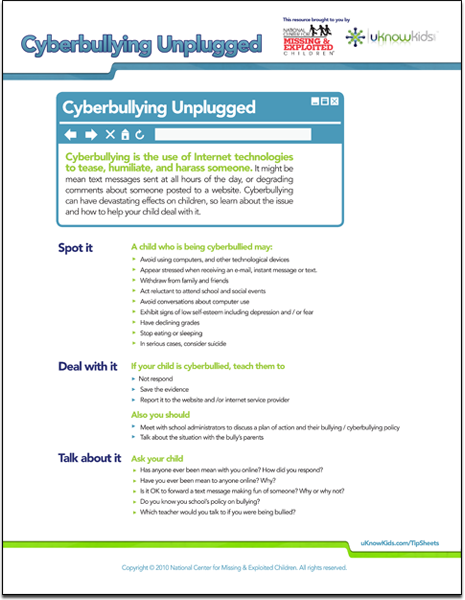MTV's True Life, a reality/documentary series that profiles real teens in episodes like “I'm a Textaholic”to “I'm a Sugar Baby” (you can look that one up to see what it means), is now accepting auditions for the newest episode, “I'm in a Sexting Scandal.”
Sexting makes its way into the headlines on a regular basis today, so it's not surprising that it has also become the subject of a True Life episode. Almost every week, I read stories about schools cracking down on sexting, kids charged as sex offenders for receiving or distributing sexts, teachers dismissed for sexting students, and states drafting new sexting legislation.
Kids Safety: What To Do When There's Too Much Texting
At this week's book club meeting, the parents in the room were bemoaning how much our teenagers text. For those of us who are used to using the good old landline phone (bonus points if yours was not cordless), it can almost seem ridiculous. New dangers and scares for parents include sexting, cyberbullying, and everything in between.
One of the moms exclaimed. “My daughter will spend half an hour texting her friends back and forth to coordinate a school project when a 5-minute phone call would clear everything right up!” Our kids just text a lot – some statistics say that the average teen sends and receives over 3,000 texts per month.
Do you feel that your teen is truly texting too much? It can be hard to get perspective on what's normal for a teen, since we didn't grow up with the option of texting anytime, anywhere. Try talking to other parents to get a feel for what's normal for your child and her peers.
Are Sexting and Texting Messaging Affecting Our Kids' English?
If you've seen one of your kids' text messages recently, you may have been concerned about what all that text-speak is doing to this generation's spelling, vocabulary, grammar, and general command of the English language. Do you need to?
It's true that text-speak is disconcerting to grammar purists, who shudder at the question “where u at?” or shortening entire phrases like “in my opinion” to “IMO.” Some English teachers also say they see too much informal language and too little structure in their student's writing, which could be attributed to texting and sexting.
However, studies like the one at the University of Toronto suggest that today's generation doesn't really have a problem switching between writing in “textese” to their friends and in more academic language in English class.
Sexting Laws Get Changed in Florida
Even though it's not smart, a lot of teens are sexting. That is, they're sending nude or suggestive pictures of themselves to each other on their cell phones. Though sexting is still a bad idea for a lot of reasons, parents in Florida should know that sexting laws that could affect their kids have changed.
Under the old law, any minor possessing or distributing a sext where the subject is under age 18 could be prosecuted as a sex offender. The new law, however, is much more lenient. What happens now when a teacher or parent finds and reports a sext on a child's phone?
How to Spot a Child Who is a Victim of Cyberbullying
Cyberbullying is the use of Internet technologies to tease, humiliate, and harass someone. It might be mean text messages sent at all hours of the day, or degrading comments about someone posted to a website. Cyberbullying can have devastating effects on children, so read below and learn about the issue and how to help your child deal with it.
Spot it: A child who is being cyberbullied may:
-
Avoid using computers, and other technological devices
-
Appear stressed when receiving an e-mail, instant message or text. Withdraw from family and friends
Kids Safety: Teen Sentenced for Killing to Pay for Online Games
 Parents worry about their kids safety playing online video games for a lot of reasons: too much screen time, too often, too late at night, too violent – the list goes on. But they probably have never given much thought to a scenario like this one before.
Parents worry about their kids safety playing online video games for a lot of reasons: too much screen time, too often, too late at night, too violent – the list goes on. But they probably have never given much thought to a scenario like this one before.
18-year old Le Van Luyen of Hanoi, Vietnam confessed in August to the triple murders of a shopkeeper, his wife, and his 19-month-old daughter (inexplicably, he also cut off the 9-year-old daughter's hand) in order to pay for his online gaming habit
.Luyen was sentenced this month to 18 years in prison for murder and armed robbery. He took jewelery and gold worth around $100,000 after the crime was committed. He told authorities he needed the money to play Kiem The, a particularly violent online game.
7 Tips for Creating a Facebook for Kids and Parents "Friendship"
Friending kids on Facebook helps you to stay connected and keep them safe from danger. But many kids feel trepidation about friending their parents.
Many parents who approve of Facebook for kids like to "friend" their kids to do a little parental monitoring. Doing something annoying or embarrassing might mean that you get unfriended, so use these tips to be a good Facebook friend to your child:
-
Pick your battles. If you are going to be Facebook friends with your child, it's pretty much guaranteed that you're not going to like everything they post. If you want to remain friends, don't mention the little infractions (their use of certain 4-letter words, for example) and stick to the big issues where their safety is really at stake (cyberbullying, sexting, dangerous friends, or sharing sensitive information.)
Teen Communication: More Texting and Sexting Than Talking
Which way does your teenager prefer to communicate? Sexting and texting, or face to face?
Most parents would guess “technology.” But even in a world where teenagers seem glued to glowing screens… face-to-face still rules. Ericsson, the cell phone manufacturer, just did a study where they asked young people, “Which method of communication would you miss the most?” The answer should be encouraging to many of us who are worried about our teenagers’ growing dependence on technology. “Meeting in person” was the number one answer.
Too Much Texting or Sexting? Is it Affecting Your Teenager?
Do you ever wonder about the impact that excessive technology might have on us as a society? Probably no one is more concerned than parents of teenagers, because teens are much more likely to text, be sexting, play games online, and use social networking all the time.
Though scientists are still forming conclusions about the effects of a digital lifestyle, one new study suggests that frequent texting may lead to shallow patterns of thought and behavior in young people.
Kids Safety Alert: Teen Driver Kills Baby While Texting at the Wheel
A kids safety nightmare for all parties involved: Nineteen-year-old Kaitlyn Dunaway from California was sentenced this week to five days in jail, 115 days home confinement, and three years probation. Her crime? Running over a mother and her 2-year-old daughter as they crossed a crosswalk while Kaitlyn was texting and driving.
The mother, 42-year-old Ling Murray, was critically injured and spent the next several months in a rehabilitation facility. The 2-year-old daughter, Calli, was killed.
Kids Safety: School Open-Technology Policies, Benefits and Challenges
Kids safety at school is a big deal, and theres no exception when it comes to internet safety, and facebook for kids at school. After a semester of watching the policy in place, here are some general reflections:
The Pros:
-
The entire school is now wireless, which makes showing videos, utilizing web tools and accessing sites, a far simpler task in each classroom. If a student brings up a question that the teacher or class needs further information about—the internet is available at the click of the mouse or tap of a finger.
-
Students are spending less of their creative brain power trying to figure out how to hide the fact that they are texting and teachers are spending less of their valuable prep time filling out detention slips for students who “couldn’t” wait until after school to send a message.
Kids Safety: Man Attacks 13-Year-Old Over Taunting On Video Game
Call of Duty: Black Ops? It's a first-person shooter game for PlayStation 3 that recreates many of the Black Ops missions of the Cold War. Even though it's rated 'M' for mature as a kids safety warning, it's really popular with teens. What's the worst that could happen?
Well, something frightening happened in the U.K. recently involving the game. A 13-year-old boy was playing Call of Duty: Black Ops at a friend's house and was talking trash to another gamer, 46-year-old Mark Bradford. Apparently Bradford knew where the boy was, and when he'd had enough he stomped into the house and began strangling him.
The Web- A Venus Fly Trap: Internet Safety
Recently I was at a dinner party with several parents. A few of us at the party have a child entering those first phases of being aware and using the web. We all began sharing stories of various funny episodes with our kids. One of the mothers suggested that we listen to a voicemail on her phone. As the voicemail started, it was her son. He is approximately eight years old, very bright and a nice boy. The boy begins to tell his mother that he had just won a free iPad online. He apparently had gotten hold of the iPad while she was gone and was surfing the net. I took a deep breath and thought, "uh oh."
Technology Blurring the Line Between Right and Wrong: Kids Safety
Cell phones keep us connected. They're convenient, save us time, and could even save our lives in a true emergency. But when used irresponsibly, mobile phones can wreak havoc. And it appears that technology is blurring the line between right and wrong – for our kids, anyway.
One study from Common Sense Media reports that 1 in 3 kids use their cell phones to cheat on tests, but that 1 in 4 kids surveyed didn't think that accessing notes during a test, texting friends with answers during a test, or using their cell to search the Internet for answers is cheating.
The incidence of plagiarism, the other bane of a teacher's existence, has skyrocketed since the advent of the Internet. How much easier is it to cut and paste blocks of text, maybe even mixing them up a bit to make the work appear original, than to painstakingly transcribe words from a copyrighted book or magazine article?
Should Parents Try to Add Themselves on Their Kids' Facebook Accounts?
A 2010 survey by Retrevo found that almost half of parents are Facebook friends with their children, a subject that most parents and children have strong feelings about one way or the other. Many parents will use parental controls or parental monitoring for Facebook for kids.
Some parents make two-way “friending” an absolute requirement for their social-networking kids to keep their Facebook accounts. Parents at the other end of the spectrum have declined their kids' friend requests, believing that parents and children should never be Facebook friends at all.
Are you Facebook friends with your kids?
Sexting Linked to Depression, Psychological Distress, and Suicide
Every parent knows that teen sexting is potentially really, really bad news. Sexting can spread around the school in minutes and humiliate the subject, or worse they can find their way online and become the common property of every pedophile with a broadband connection. But a recent research study also suggests that kids involved in sexting are twice as likely to experience psychological distress and even attempt suicide.
The Education Development Center in Newton, Massachusetts analyzed the results from a group of 23,000 high school students in the Boston area who were surveyed in 2010. The schools were situated in predominately upper-middle class white suburbs, so further research needs to be done on different demographics of teens.
Global Perspective on Cyberbullying
Every few months, a new study is released in the United States or the U.K. giving new statistics and information regarding cyberbullying – the act of minors who threaten or harass each other (sometimes with serious consequences) using technology. But what might larger cyberbullying statistics across the globe, not just from one country, look like?
In a January 2012 survey for Reuters News, global research company Ipsos polled a total of 8,600 adults from 24 different countries to get a better feel for cyberbullying across the globe. The countries surveyed were Argentina, Australia, Belgium, Brazil, Canada, China, France, Germany, Great Britain, Hungary, India, Indonesia, Italy, Japan, Mexico, Poland, Russia, Saudi Arabia, South Africa, South Korea, Spain, Sweden, Turkey and the United States of America.
Replacing Facts with Skills in the Classroom: Internet Safety
A student asked me recently: “Why do I need to know when Frankenstein was published? I have a smart phone—I can always find the answer if I need it.”
He was right. And while I can expound easily and at length about how important it is to understand the time period in which an author was writing in order to fully analyze the novel, for most students in American high schools today, my lecture would fall under the “not relevant—tune out” category, and instead of listening to me, they’d spend the next twenty minutes ignoring my painstakingly planned lesson in favor of tweeting and texting their friends from under their desks.
School Bullying and Cyberbullying Outbreak
@&%#?!! MTV Poll Says Kids' Language Worse Online + Sexting
An MTV poll shows that kids are both more likely to use vulgarity and slurs online and less likely to be offended when someone else does it. The online survey asked 1,355 people ages 14-24 about the language they and others use when texting or social networking, and found some surprising results. Much of this language is closely associated with cyberbullying, sexting, and other hot teenage issues.
Slurs targeting women, racial minorities, and homosexuals are becoming commonplace online. Kids also admit that they are becoming blasé about reading words like “slut,” “fag,” “retard,” and even the N-word in cyberspace.



















